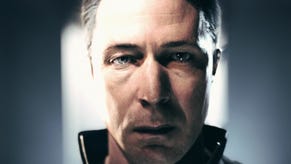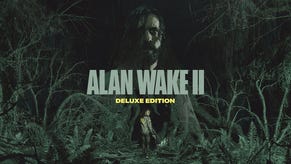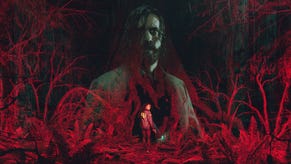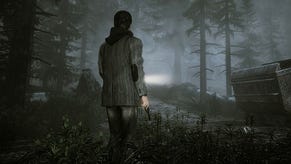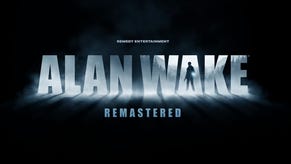Alan Wake
Sleepless in a sleepy town.
Remedy loves exploring the troubled, brittle souls of embattled male protagonists fighting for their lives after their partners are taken away from them. First Max Payne saw his wife executed right in front of him before taking on an entire army of drug scum and corrupt cops as a perverse form of catharsis. Now we must enter the sleepless, delirious world of insomniac horror author Alan Wake, a character "straight out of a Stephen King novel" besieged by nightmares after his partner goes missing, presumed dead. Remedy did always have a penchant for tragic tales with self-explanatory names.
As Remedy's Sam Lake explains: "Alan Wake is a psychological action thriller. We use the blurring line between dreams and reality as a theme. The familiar setting is the idyllic American small town with something threatening waiting under the surface. The main character and the premise, the horror writer whose life turns to a nightmare who comes straight from a Stephen King novel, and we used all of those elements and put them within the framework of a Hollywood blockbuster action type game."
Wake up, Boo
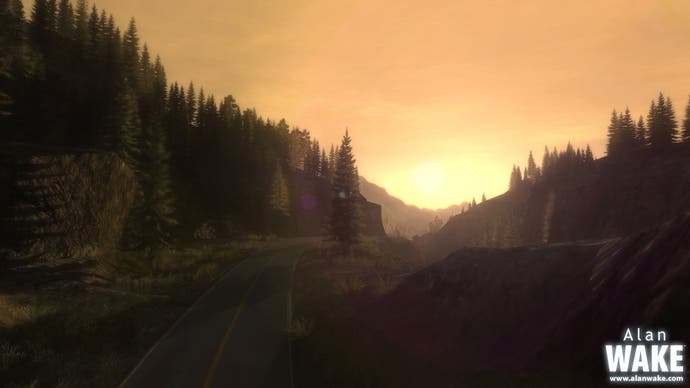
The player picks up the thread with Wake tormented by a sleepless world of nightmares and a tenuous grip on realty - not to mention writer's block. In a desperate attempt to get his life and career back together, Wake heads out of town to Pride Falls, a sleepy American town in Washington with a couple of thousand occupants. Very Twin Peaks.
Wake heads for a clinic to help with his sleep problems, but things only get worse for this hapless author. "There is a mysterious woman there who looks just like Wake's missing fiancé," says Wake. "His dreams return. He begins to see terrible nightmares, and he begins to write again - a new book based on those nightmares.
"But something is horribly horribly wrong. Somehow, impossibly, the town of Pride Falls starts to change at nightfall. Something horrible that bears a close resemblance to Wake's nightmares. Wake is fighting for his life with a gun and a flashlight in his hand, trying to understand what's happened to him, what's real and what's imagined. Can he hope to escape, or has he gone mad?"
Smalltown oddballs
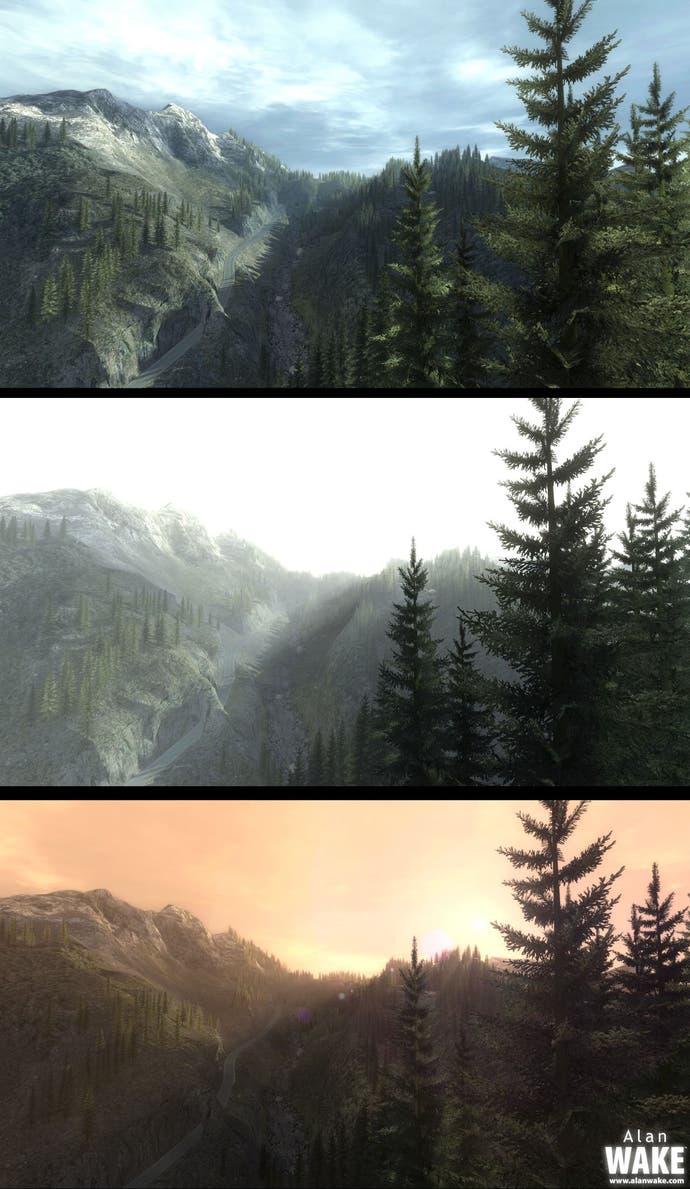
Remedy gives little impression of how the gameplay will pan out, but chooses to spend most of its time at E3 delivering the basic background alongside an impressive technology demo. Lake focuses more on the rationale for the setting for Alan Wake than the game itself: "The game is set in an old American small town, an almost iconic symbol of American culture. It's a setting that hasn't been used that often in videogames, but it's familiar to anyone from countless movies and TV series. Twin Peaks, of course is a big influence," he admits.
"It's a charming, quirky place with one gas station, a diner, a church, a sheriff's station, and a town hall," Lake illustrates. "As the cliché about small towns goes, they are lovable on the surface, but they always have dark terrible secrets lurking underneath just waiting to burst out with horrible consequences, and that's where Alan Wake comes in." Atmosphere and narrative were undoubtedly strong elements of Max Payne, and there appears to be every reason to expect the same will apply to Alan Wake.
In technology terms, Alan Wake is already looking truly "next generation", with the promise of a vast scalable world with its own weather systems and benchmark-setting lighting model that changes the whole look and feel of the environment. "In Max Payne 1 and 2, we set out to do something that somebody might call a fairly linear experience. With Alan Wake we've taken a different approach. We set out to model a huge free-roaming open world where the player is the driving force," Lake says.
A remedy for the linear blues
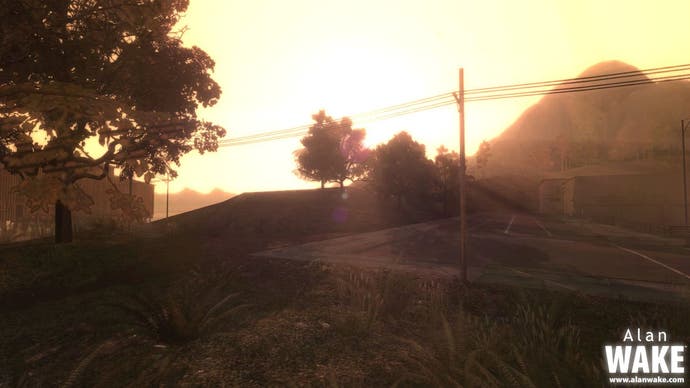
"It's a mission-based design, and you could say that previously we were maybe doing kind of a movie set game," says Lake. Whether the game will take the sandbox structure of GTA remains unclear, but it seems certain the game will be a lot less restricted in structure than Remedy's previous efforts.
"This time we set out to model the whole world, and we've made quite a big effort in making this living breathing world where everything runs within a simulation and everything interacts," he explains. As if to prove the point, the wind can dynamically change the way the water moves, whipping up a storm and sending leaves swirling through the air with stunning realism. It's evident that Remedy's claim that "everything has a physical dynamic" is no idle marketing claim. As you'd expect from a next-gen game sporting Havok physics, everything is open to dynamic interaction with, reacting to what you do. With real-time lighting the spectacle is a very impressive one, with perfect shadows cast on the smallest level. "Mountains cast huge volumetric shadows," Lake says. "You can really see something that we think has never been done in real-time before, and that's truly next generation."
The most cunning aspect of the attention to detail over the lighting is that it has huge gameplay implications specific to the game. "Lighting is a very critical gameplay element. As Wake's world turns more and more nightmarish, darkness gets a stronger hold of him," asserts Lake. "Nights grow longer, days shorter. Wake's enemies - the shadowy men that haunt his dreams - come out at night.
Exciting! Lighthouse! Gameplay!
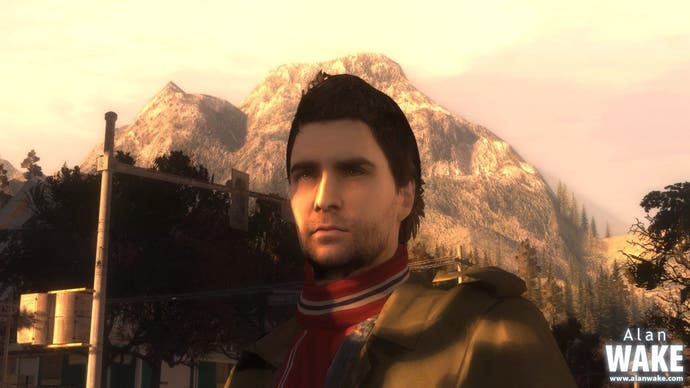
"They seem to gain their strength from darkness and vice versa. That means that night time is the most dangerous time in the game and light is a valuable ally, be it the sun or the flashlight Wake waves around," Lake promises. "We have all kinds of ideas that we want to explore in this. Portable floodlights that the player can place anywhere he wants in the world, or motion sensors that turn those lights on automatically when an enemy approaches. When light is a gameplay element even ordinary things such as a lighthouse offer interesting and exciting gameplay possibilities," he adds.
Indeed, the game feels like a more interactive, more believable Silent Hill. An unhinged game where you've every reason to feel scared of things that come adorned in black-hooded robes and stalk the night.
As ever, Remedy is drawing on familiar themes to create something all of its own: "In the Max Payne games we used movies as our inspiration - John Woo and Hong Kong action movies for the gameplay, Film Noir detective stories for the game story. This is our way of doing things. We take the classic elements that everyone is familiar with and we make something new out of them. Max Payne's story arc was modelled on a movie. With Alan Wake, we are using a season of a TV series."
Without waking
As the 15-minute-long demo draws to a close we witness a tense sequence where Wake is desperately trying to reach the safety of a nearby lighthouse before sundown, driving recklessly through the tree-flanked country lanes before dashing furiously across a rickety old bridge, leaping across broken sections before discovering a locked gate at the end of it. With Wake seemingly out of luck, his misfortune grows when several black-robed figures head in his direction. Let's hope he has his torch with him.
As the Dylan Thomas quote at the end of the presentation notes: "Do not go gentle into that good night, Old age should burn and rave at close of day, Rage, rage against the dying of the light." If there's one thing that scares the bejesus out of all of us, it's the things that might be lurking in the darkness. Alan Wake knows all of this only too well...
Alan Wake is being developed by Remedy on the PC and "next generation consoles". No release date has been set.



